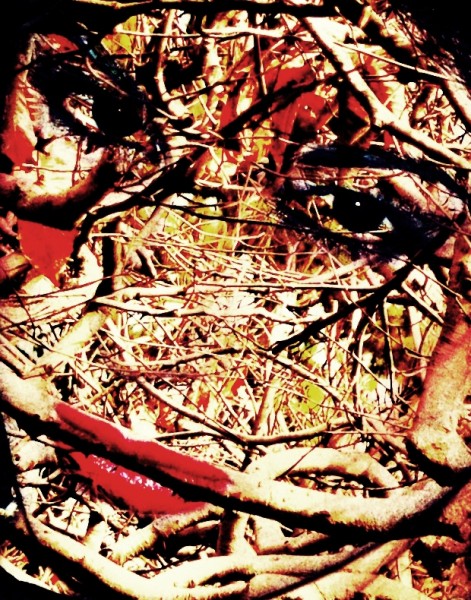Heidi Sutherton disappeared from Lumitown in the summer of 1973. She was seventeen years old—seven years older than my best friend Margaret and I—and lived right across the street from me. Our next-door neighbor told us the news—Mrs. Carmichael, with her chin mole shaped like a pencil eraser. Snatched right in front of the house, Mrs. Carmichael told my mom. Margaret and I eavesdropped while we played Maui Beach under the weeping willow, arranging Beach Barbie and Malibu Ken side-by-side on Burger King napkin beach blankets, their plastic hands and legs mashing in a way that seemed illicit. On her way to Bible Study. The shame of it. There was something about the huddled adult heads, the buzz of the word ‘shame,’ that made Margaret and me look up. Mrs. Carmichael pointed at us. I’d keep those girls inside. That’s what I’d do if I had a girl in this town.
Lumitown’s night sky was filled with batman beams from search copters; cones of light shone down on forests of blue spruce and wild holly. Our town sounded like the nightly news reports from Vietnam, the Hueys and their deafening pulses of air. I stared out my bedroom window at the strange light show, looked beyond it to Heidi Sutherton’s house. Shadows moved behind Heidi’s bedroom curtains. I imagined police officers, search dogs. Maybe they were reading Heidi’s diary for clues. It wouldn’t take much for them to figure out about that boy Conrad—the one who crept into the Sutherton’s yard at night and threw rocks at Heidi’s window until she’d appear in her sunflower nightgown and wave him off. Heidi told me about Conrad one time she babysat me, while she French-braided my hair.
There’s this boy who likes to brush my hair, she’d said. His name is Conrad. He tells me I’m magic.
Magic? Like the Ouija board you showed us? I asked.
Heidi threaded three bunches of my hair through her fingers, tightened her grip as she wove my braid. Kind of like that, Lucy, but not quite.
I liked the feel of Heidi’s fingers manipulating my thin scraps of hair into a pattern, her smell of patchouli and cool breath on the back of my neck. Is he your boyfriend?
Heidi laughed. Oh Lucy, if it were that simple. She gave my braid a tug. Conrad’s not like us. He’s different—too different.
I had visions of Sesame Street, how frogs could date pigs. But different is good, right?
Heidi reached the bottom of my braid. Remember how Ouija was our secret? She wrapped the ponytail with an orange-beaded tie. Conrad is a secret too.
After that day, I tried to keep watch over Heidi, running to my bedroom window if I heard rock sounds at night. I thought I saw the dark shadow of Conrad at least twice, Heidi’s hands waving goodbye to him and then the scratch of her window shutting. Ever since she went missing, Heidi’s bedroom light shone honey yellow all night long. I wondered if she’d still want me to keep her secret.
There was no trace of Heidi. Margaret and I were forbidden to walk the half block to each other’s houses or to go outside alone. Can’t I just play in the backyard? Mom slapped her hands on her apron. What kind of mother would that make me? Mom looked as frenzied as Heidi’s mother on Eyewitness News. Heidi’s story was on TV every night, even before the Vietnam updates and the photographs of all the lost boys.
The doorbell rang and it was Margaret, alone. I looked past her, up and down the tree-lined street. How did you get here? Margaret looked at me like I had my finger up my nose. I escaped, she said. She skipped her way past me to my backdoor. We can’t leave Barbie and Ken in Maui forever to rot, now can we?
Truth is, I’d forgotten about Barbie and Ken, the beachfront paradise we’d carved out for them in the flat spots between the weeping willow’s roots. We abandoned them the day Heidi disappeared. I didn’t look back that day to see if Mrs. Carmichael watched us go inside, but I know she did. That summer after Heidi disappeared, Mrs. Carmichael kept guard over Margaret and me from behind darkened curtains, yelling if Margaret or I let out a play scream—You girls okay? Mrs. Carmichael protected us in ways we couldn’t see but could only feel—like the glassy pull of an Ouija planchette, the same pull that told Margaret and me, later that summer, that Heidi Sutherton was dead, long before they found her remains under sticks and rotted leaves in Ridley Park. The same slick pull that slid the planchette past YES, past NO, when we called upon Heidi Sutherton, asked her if she was safe—the open circle hovering over GOODBYE.

Notes from Guest Reader Shasta Grant
I love the use of objects in this story: Beach Barbie, Malibu Ken, the Burger King napkins acting as beach blankets. The specificity of these objects evokes a particular time period but also carries emotional weight and develops character.


 Included in the price of SmokeLong Fitness:
Included in the price of SmokeLong Fitness: